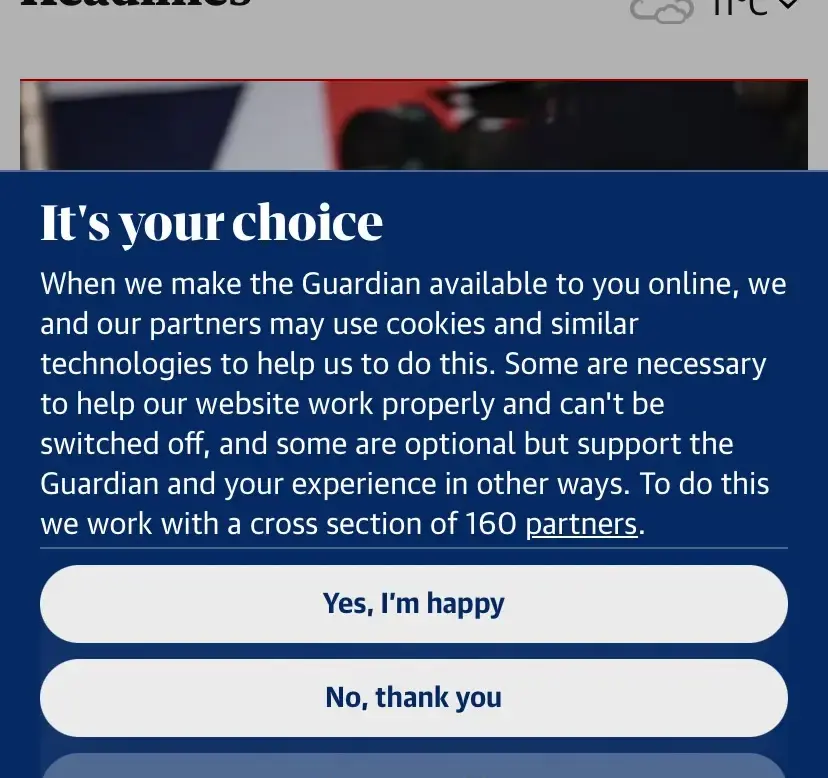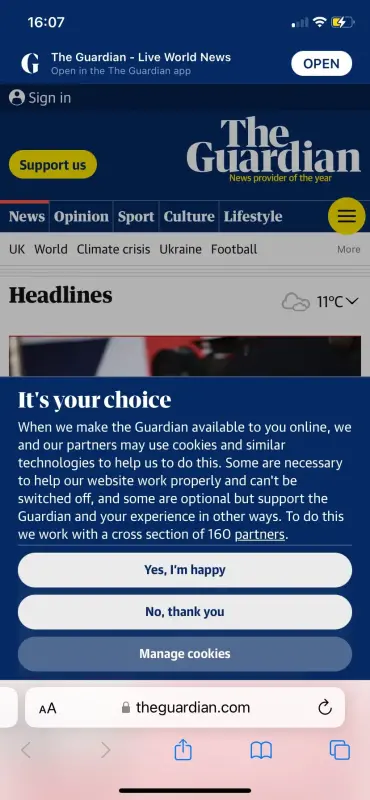
The Guardian has changed its website messaging around persuading readers to accept tracking cookies in the light of recent ICO guidance.
It has also sent an open letter to the advertising industry explaining why it believes its cookie-less solution Guardian Light can result in higher viewability scores and click-through rates even if fewer people agree to be targeted by third-party cookies.
Users of The Guardian’s website are now asked if they will accept the use of optional cookies which “support the Guardian and your experience”. The two options on the first screen are: “Yes, I’m happy” and “No, thank you” alongside a manage cookies button that will give them further information.
Users will see advertising either way, but if they click the option to reject then they will only be served ads that are not “reliant on first or third party cookies, tracking or programmatic auction technology”.
Previously users could tell The Guardian “Yes, I’m happy” but would have to click through to the manage cookies page to reject all. Many other UK publishers still have a similar setup.
The change came after the Information Commissioner’s Office began to enforce rules stating users should be able to reject all cookies “as easily” as they can accept all.
Many publishers have been concerned about this, saying that if it is made more easy for users to reject all cookies then many more of them will do so – posing a serious threat to advertising revenues.
Guardian cookies evolution ‘a massive step forward’
Imogen Fox, chief advertising officer at The Guardian, has written to the publisher’s clients and agencies explaining the change.
She said Guardian Light, which was unveiled in November, can still show people contextually relevant ads even if they have turned down targeting or personalisation.
Fox wrote: “In this new world, a takeover of the Guardian’s website is actually a takeover. A sponsorship is a full sponsorship. 100% share of voice to the whole Guardian audience. This is particularly important in a year full of big cultural moments like the Olympics and the Euros.
“We’re delighted that brands such as Monzo have already run campaigns through Guardian Light to great effect. Less data means faster load times. We’ve seen significantly improved viewability scores (as high as 90%) and CTRs.
“Advertising is extremely important to the Guardian. It helps fund our unique and vital journalism. Responsible advertising stretches beyond the brands that we work with, it also applies behind the scenes too.
“We think we have taken a massive step forward with this change and we hope others will join us.”
The publisher previously shared an estimate that “about 30% of people on the open web click ‘reject all'” when given the option – but other estimates put that figure as high as 70%.
Guardian: Reader support crucial without personalised ads
The Guardian has published a blog post to its readers explaining the importance of them either agreeing to targeted advertising or supporting the newsbrand in other ways.
It said: “You might also start to see more messages on articles asking you to support the Guardian in other ways.
“The reality is that without the use of data to personalise advertising to readers, brands will spend less money on advertising with publishers like us. Less money generated from advertising means that we need to ask readers to contribute to funding our journalism directly.”
Even without the “reject all” crackdown advertising revenue at The Guardian was down £9m (16%) in the nine months to 31 December.
Some UK publishers are now considering a “consent or pay” model in view of the ICO’s crackdown, meaning users would be asked to either agree to share their personal information for better targeted advertising or pay to keep their data private, countering the potential hit to higher-yield advertising.
The ICO is currently examining its regulatory approach on consent or pay, which is already in use by publishers in Germany and some other countries.

Email pged@pressgazette.co.uk to point out mistakes, provide story tips or send in a letter for publication on our "Letters Page" blog
